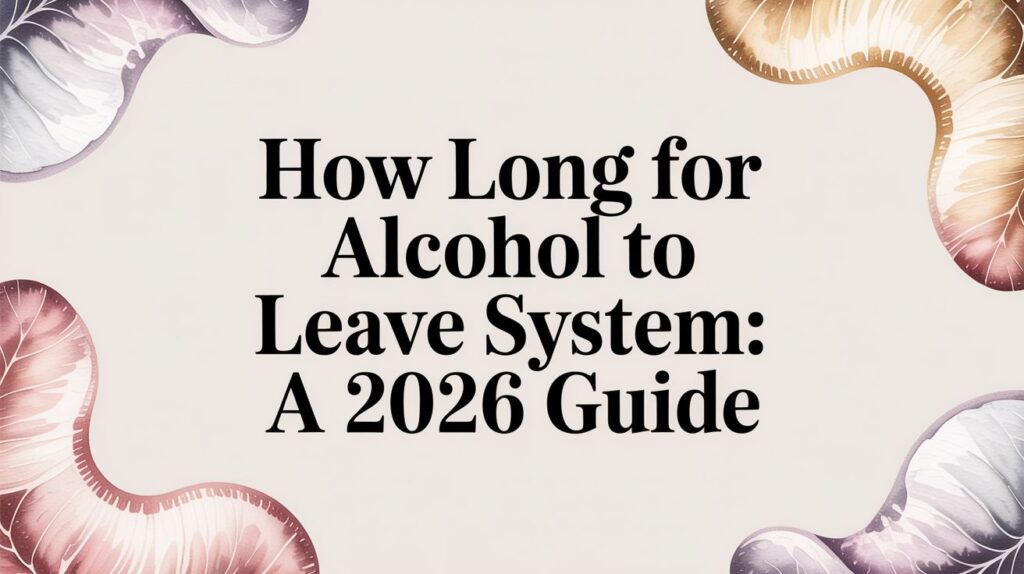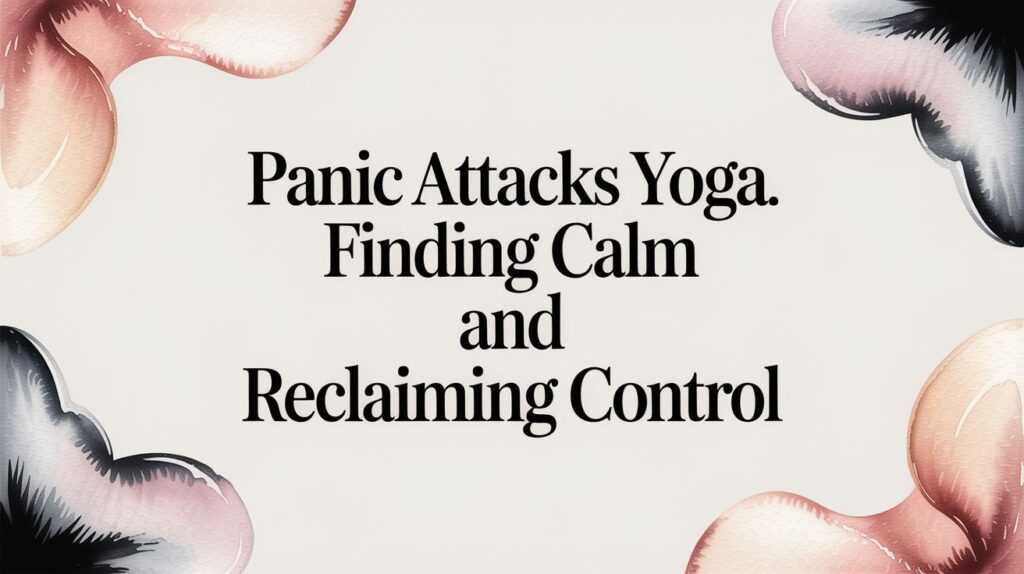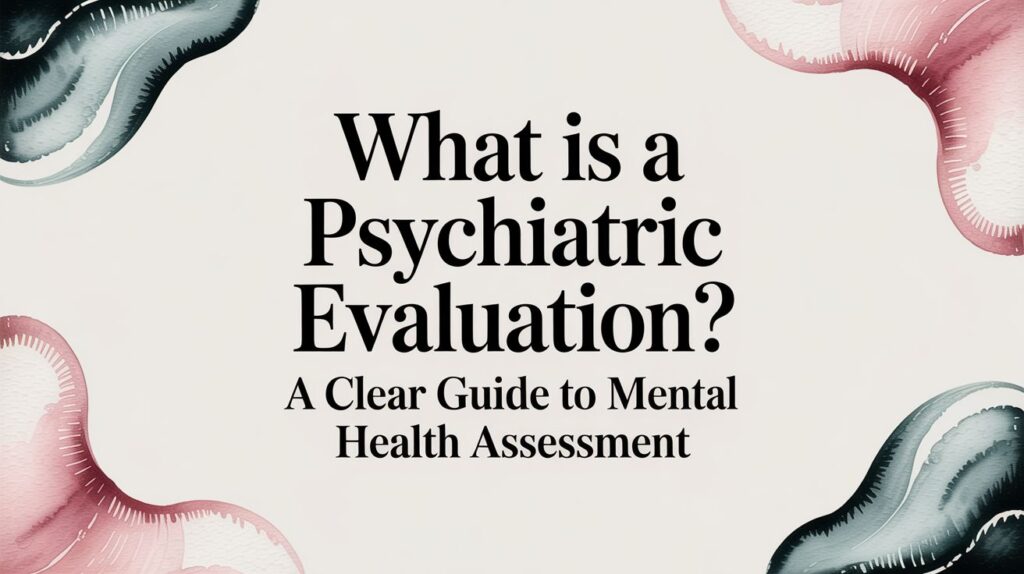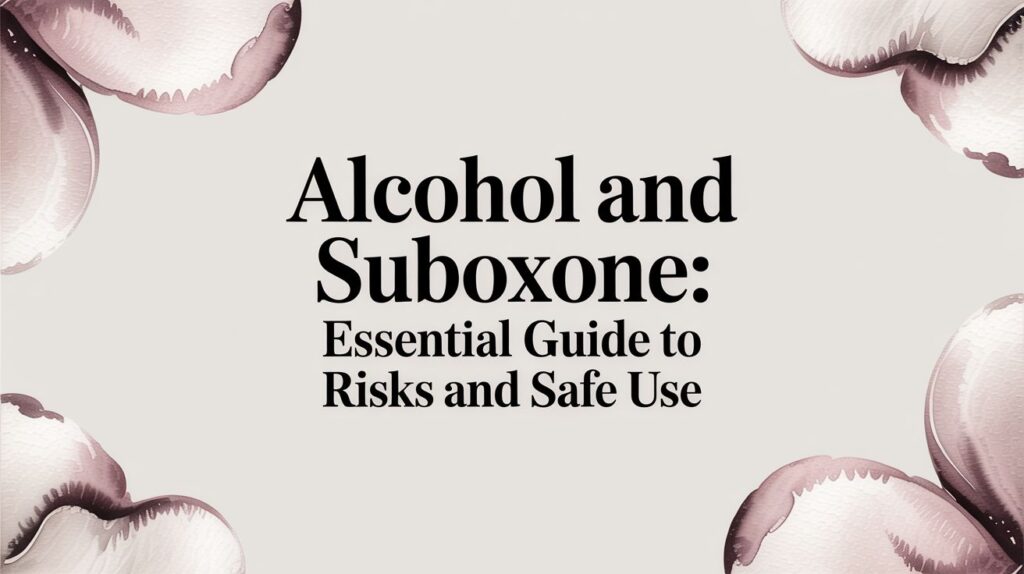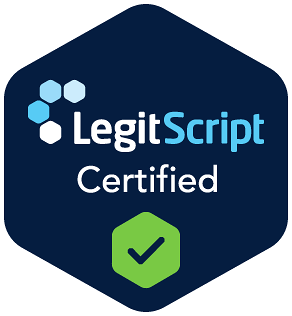When your spouse struggles with alcoholism, it can feel like you're navigating a relentless storm alone. The emotional toll of broken promises, unpredictability, and worry often leaves you feeling isolated, exhausted, and overwhelmed. Finding stability for yourself is not selfish; it's essential for your own well-being and a critical step toward creating a healthier environment for everyone involved. You don't have to face these challenges without help.
This guide is designed to be your anchor, connecting you directly to the vital resources created for people in your exact situation. We have compiled and analyzed a comprehensive list of the best support groups for spouses of alcoholics, ranging from well-established 12-step fellowships to evidence-based clinical programs and specialized online communities. Each option offers a unique pathway to understanding, healing, and reclaiming your own life.
Instead of just listing names, we provide a detailed breakdown for each resource, including screenshots and direct links to help you get started immediately. Whether you need structured peer connection, professional therapeutic guidance, or practical coping skills, you will find a safe harbor here. This listicle will help you compare your options and select the most suitable group to begin your own journey toward peace and resilience.
1. Outpatient Programs – Altura Recovery
Altura Recovery’s Outpatient Programs deliver highly structured support groups for spouses of alcoholics by combining therapist-led peer meetings with family sessions. Participants transition from inpatient care or detox into a sustainable routine that respects work, school, or caregiving responsibilities. With a focus on trauma-informed modalities, spouses learn to manage emotional triggers and develop healthy communication patterns.
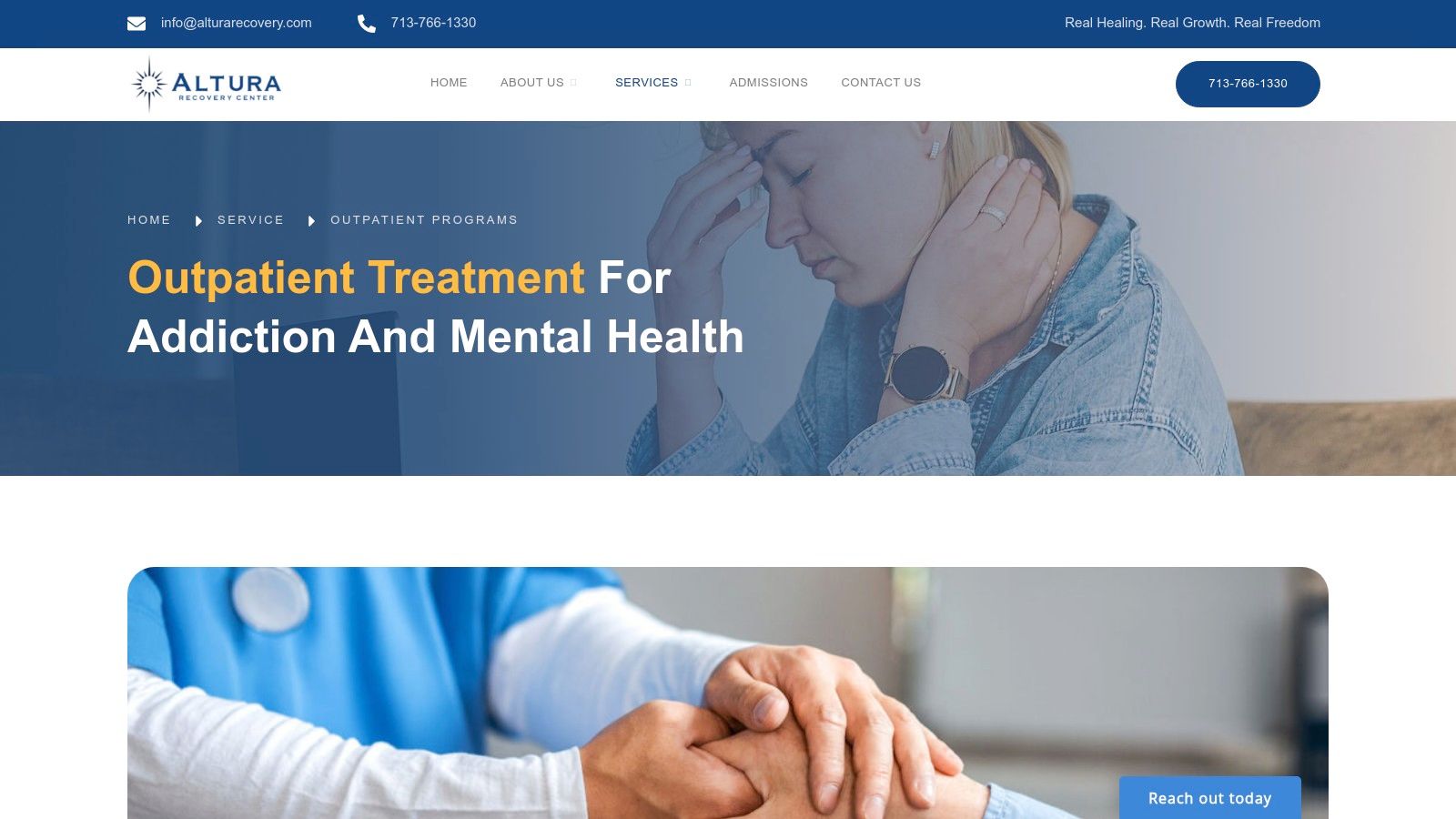
Real-world applications include structured role-play in group sessions and personalized homework tasks that reinforce coping skills. Pricing varies by session length; contact Altura Recovery for a complimentary consultation and verify insurance or sliding-scale options during intake.
Key Features
- Flexible scheduling: day, evening, virtual formats
- Integrated therapies: CBT, DBT, EMDR, mindfulness
- Optional family seminars focused on education and coping skills
- Licensed clinicians offering psychiatric evaluation and medication management
- Motivational recovery coaching and relapse prevention strategies
- Protected online community forum for spouses
Program Comparison
| Format | Session Times | Location |
|---|---|---|
| Day | 9am-3pm | Houston, TX |
| Evening | 5pm-8pm | Houston, TX |
| Virtual | Flexible | Online platform |
Practical Tips
- Complete the online assessment to secure preferred session times
- Leverage the web portal for scheduling, resources, and progress tracking
- Invite family members to dedicated support meetings for network resilience
- Ask about combined therapy-family rates during initial consultation
Pros
- Comprehensive evidence-based therapies
- Seamless blend of individual and family support
- Responsive customer service and user-friendly portal
Cons
- Less intensive than inpatient programs
- Access may be limited outside Houston or internet constraints
Learn more at Outpatient Programs — Altura Recovery
2. Al-Anon Family Groups
Al-Anon Family Groups is the best-known peer support fellowship for spouses of alcoholics. It offers in-person, phone, and online meetings with a spouse-specific focus, newcomer resources, a literature store, and an official mobile app.
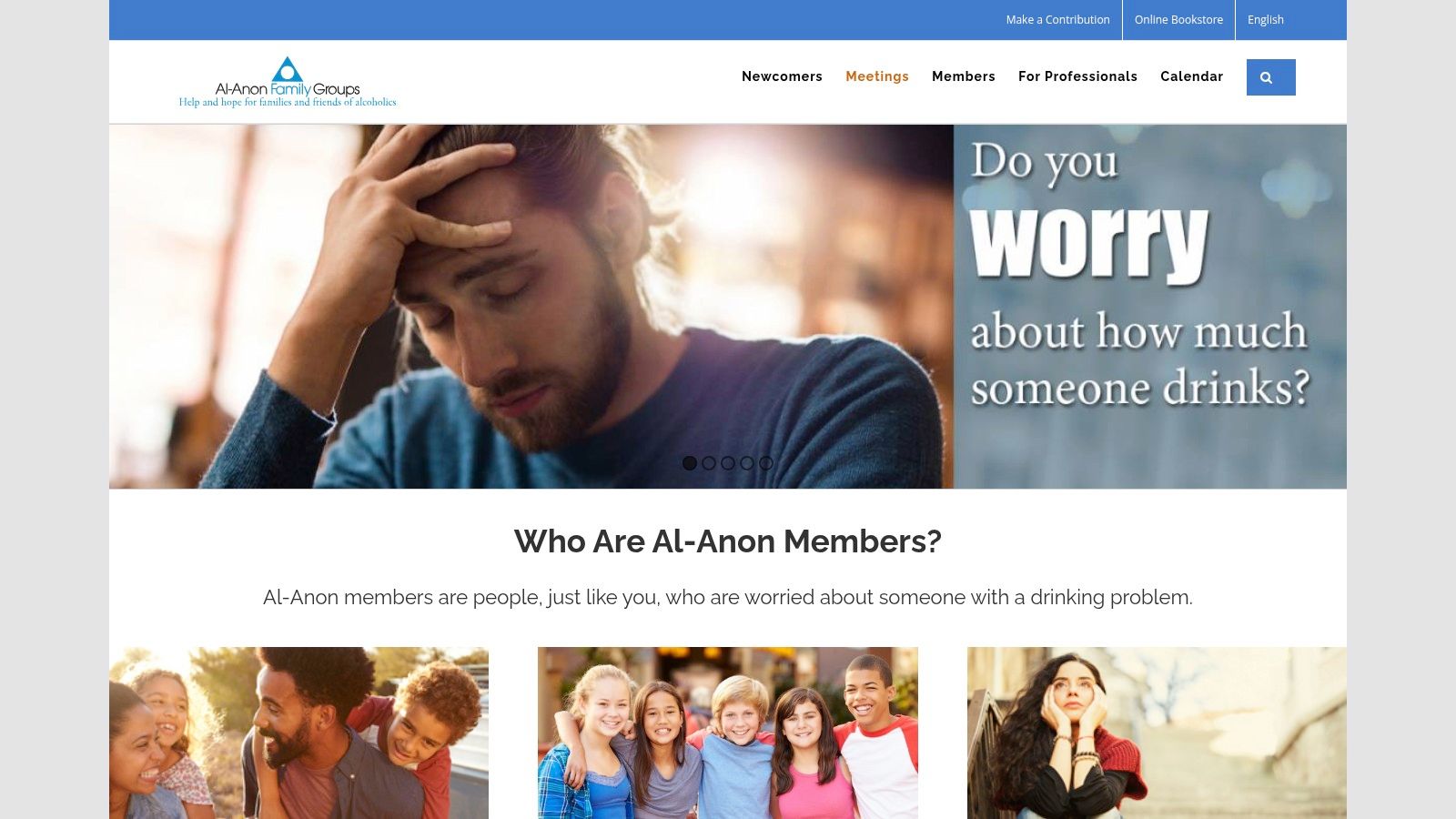
Key Features
- National/international meeting finder (Zoom, phone, email)
- Official mobile app (iOS and Android) with meeting access and journaling
- Extensive newcomer information and downloadable service manual
Pricing & Access
- Free to attend with voluntary contributions
- No signup fees or subscriptions
- Meetings available 24/7 via website or app
User Experience
The website interface is straightforward, featuring a searchable directory and clear joining instructions. Customer support is volunteer-led via email and phone.
| Format | Access Method |
|---|---|
| In-person | Local meeting finder |
| Virtual | Zoom link or phone |
Practical Tips
- Bookmark the electronic meetings directory for quick access.
- Use the journaling feature in the app to track emotions.
- Download newcomer literature before your first session.
Pros & Cons
Pros
- Wide availability and spouse-specific focus
- Free with flexible formats
Cons
- 12-step spiritual framing may not suit everyone
- Meeting quality varies by group
Visit the official website to join: https://al-anon.org
3. SMART Recovery — Family & Friends
SMART Recovery offers an evidence-informed, non-12-step program for loved ones of individuals with addiction. Its Family & Friends meetings use tools from Cognitive Behavioral Therapy (CBT) and motivational interviewing to help spouses develop effective coping strategies and communication skills. This science-based approach provides a structured alternative to traditional support groups for spouses of alcoholics.
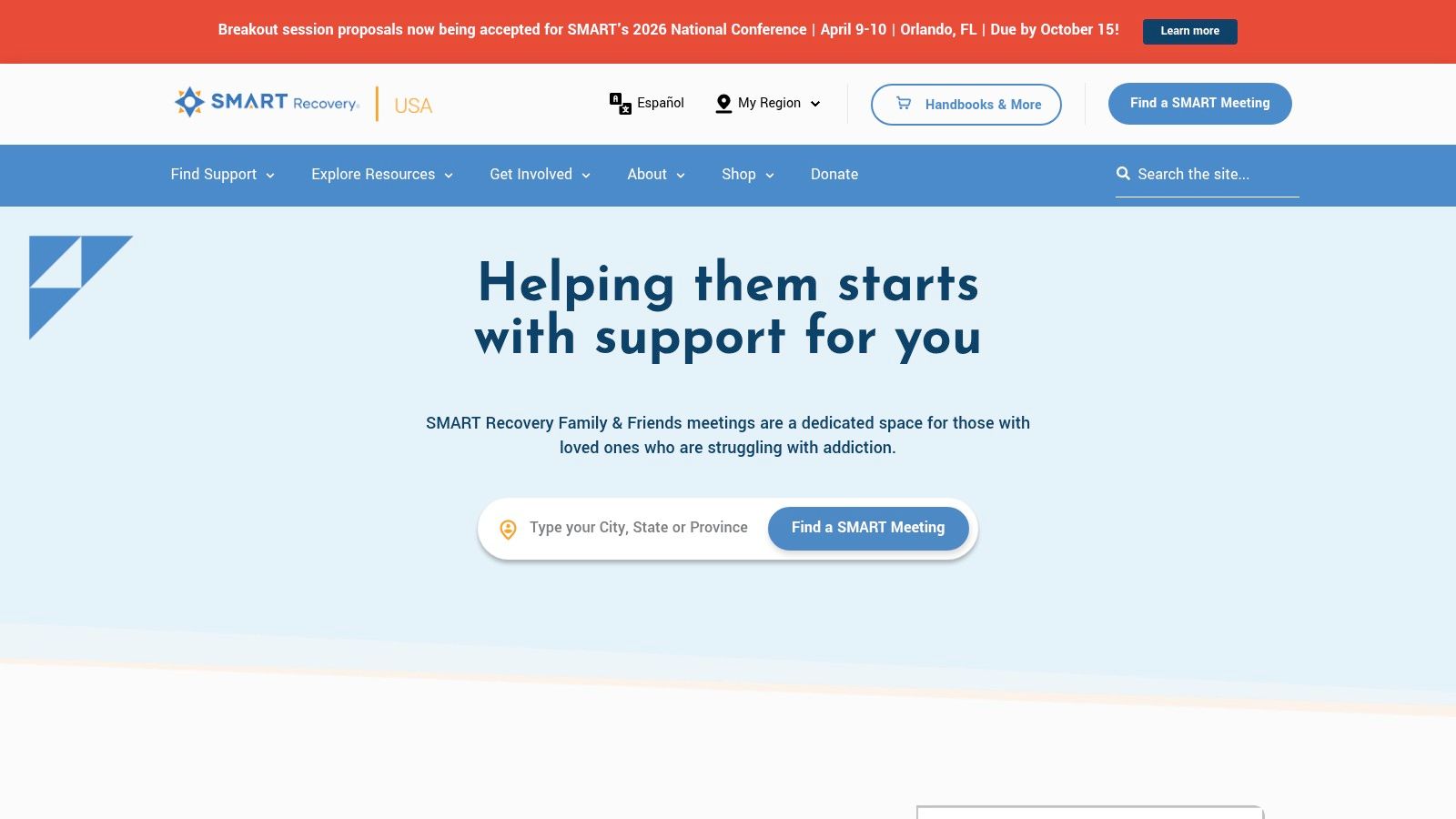
Key Features
- Facilitator-led Family & Friends meetings (online/in-person)
- Downloadable worksheets focused on communication and boundaries
- U.S. meeting locator and a mobile app for broader SMART Recovery tools
Pricing & Access
- Free to attend meetings, with donations encouraged
- No sign-up fees required for participation
- The Family & Friends handbook is available for purchase
User Experience
The website cleanly separates resources for individuals in recovery from those for family members. The meeting finder is easy to navigate, though the mobile app is geared more toward general SMART Recovery tools rather than being specific to the Family & Friends program.
| Format | Access Method |
|---|---|
| In-person | U.S. meeting locator |
| Virtual | Online meeting schedule |
Practical Tips
- Download the free introductory worksheets before your first meeting.
- Attend a few different meetings to find a facilitator whose style you prefer.
- Explore the program's 8 essential coping skills for substance abuse to supplement meeting takeaways.
Pros & Cons
Pros
- Skills-based approach rooted in scientific principles
- Clear structure with predictable 90-minute meetings
Cons
- Fewer specific Family & Friends meetings than Al-Anon
- The supporting handbook must be purchased separately
Visit the official website to join: https://smartrecovery.org/family/
4. Families Anonymous
Families Anonymous is a 12-step fellowship for relatives and friends concerned about a loved one's substance abuse or related behavioral problems. It provides a broad support network that includes specific support groups for spouses of alcoholics, emphasizing anonymity and shared experience.
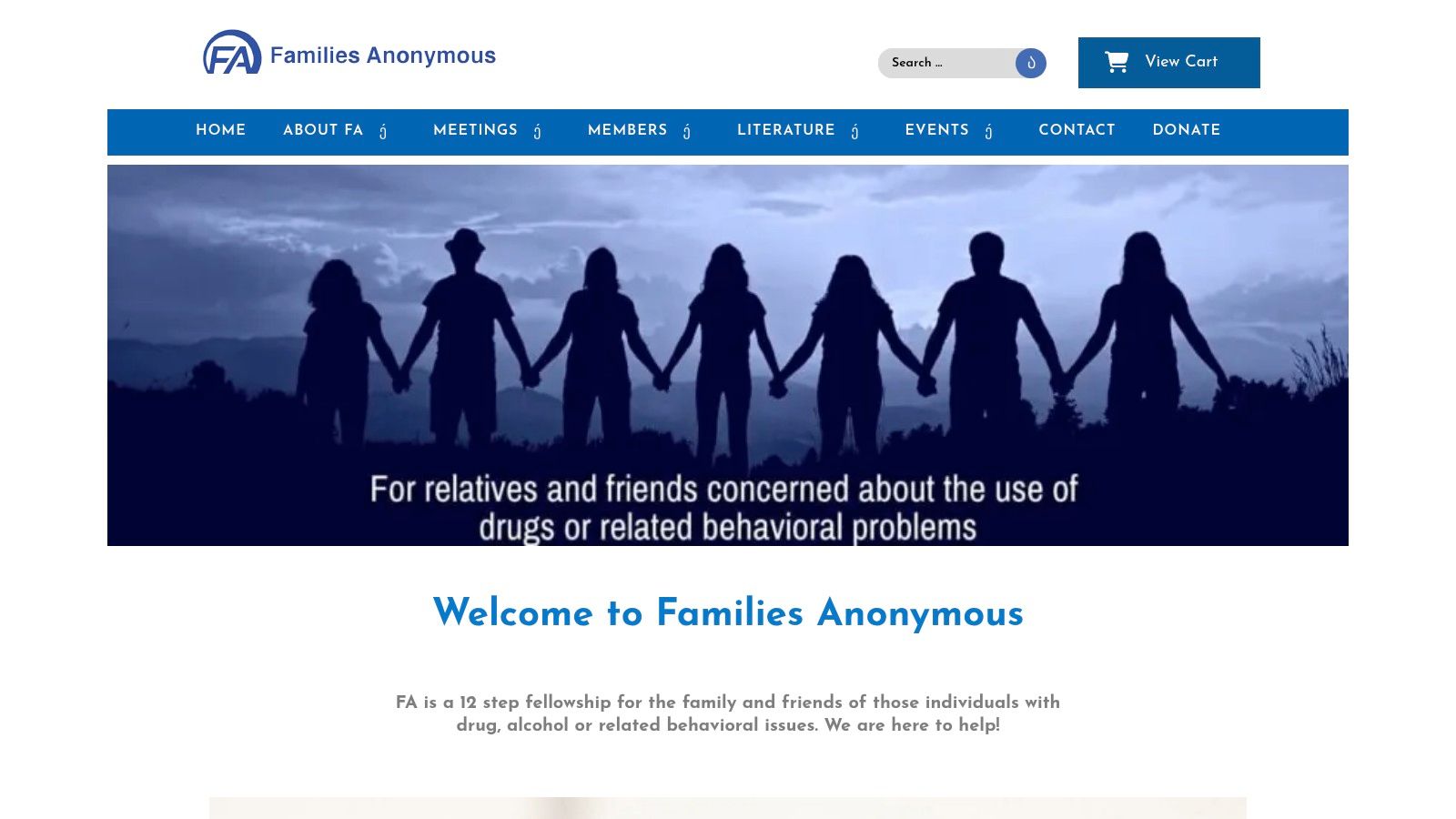
Key Features
- Virtual and in-person meeting directories for the U.S. and Canada
- Niche meeting options including dedicated 'Significant Others & Spouses' groups
- A 24/7 email listserv (E-Meeting) for continuous, asynchronous support
Pricing & Access
- Free to join and participate; no dues or fees required
- Voluntary contributions are accepted to support group expenses
- Meetings are accessible via the website's directories without registration
User Experience
The website has a simple, dated interface but is functional, with clear directories for finding meetings. The "Find-A-Meeting" tool allows users to filter by format and day, making it easy to locate relevant spouse-specific support.
| Format | Access Method |
|---|---|
| In-person | Local meeting finder |
| Virtual | Zoom, phone, or Google Meet |
| E-Meeting Listserv |
Practical Tips
- Filter the virtual meeting list for "Significant Other/Spouse" to find targeted support.
- Join the E-Meeting listserv for around-the-clock access to peer advice.
- Read the "For The Newcomer" section before attending to understand the program's principles.
Pros & Cons
Pros
- Multiple meeting formats with clear scheduling
- Emphasis on anonymity and a non-judgmental environment
Cons
- Broader focus includes issues beyond just alcoholism
- Some general meetings may be more parent-focused than spouse-focused
Visit the official website to join: https://familiesanonymous.org
5. In The Rooms
In The Rooms is a large-scale online recovery platform hosting over 100 live weekly video meetings. It serves various 12-step and non-12-step fellowships, making it a comprehensive hub for those seeking support groups for spouses of alcoholics alongside other recovery communities.
Key Features
- Live video meetings with high volume and flexible schedules
- Community features like direct messaging, newsfeeds, and blogs
- Meeting finder includes virtual meetings, local face-to-face meetings, and treatment resources
Pricing & Access
- Free to join and participate
- Simple signup process with anonymity options
- No fees or subscriptions required for meeting access
User Experience
The website has a social media-like feel, with a central newsfeed and easy-to-navigate meeting schedules. The platform design encourages interaction beyond meetings, fostering a sense of community. Filtering is required to find spouse-specific groups.
| Format | Access Method |
|---|---|
| Virtual | Direct links on website |
| In-person | Searchable directory |
Practical Tips
- Use the search filter to find Al-Anon or other family-focused meetings.
- Engage with the community blogs and newsfeed for additional support.
- Explore different meeting types to see if a 12-step or non-12-step format is a better fit. The platform helps users compare the benefits of group therapy vs. individual approaches.
Pros & Cons
Pros
- Free with a wide variety of groups available
- Easy signup and options for anonymity
Cons
- Not all groups are spouse-specific, requiring filtering
- Some helpline links may direct to paid advertisers
Visit the official website to join: https://www.intherooms.com
6. Hazelden Betty Ford – Family & Children Services
Hazelden Betty Ford – Family & Children Services offers clinician-facilitated support groups for spouses of alcoholics, blending educational workshops and coaching. This national nonprofit provides weekly virtual and in-person sessions focused on communication, boundary-setting, and coping skills.
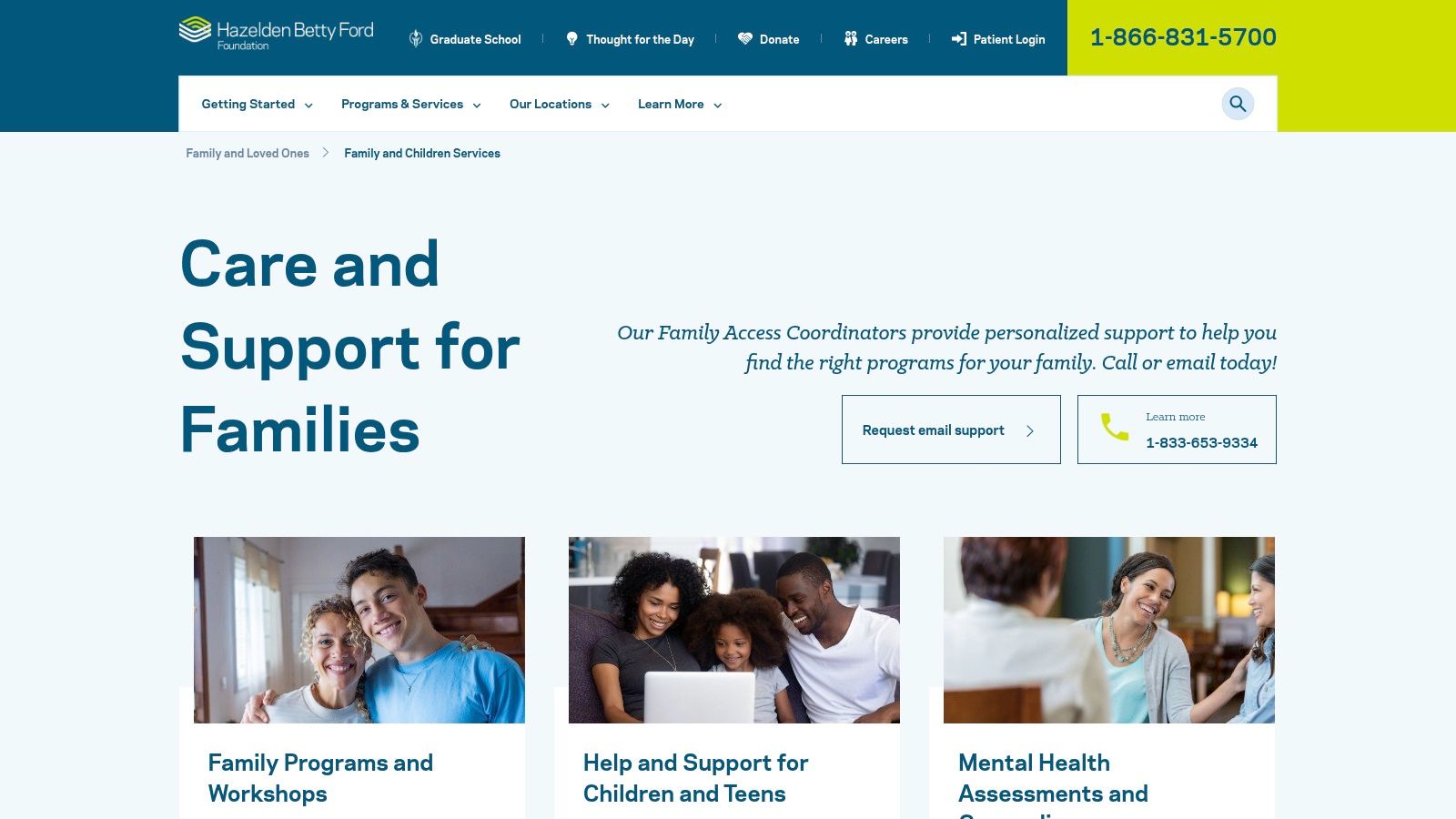
Key Features
- Weekly virtual family support groups and newcomer orientations
- Skills workshops on communication, self-care, boundary-setting
- Specialized sessions in Spanish and Native American family formats
Pricing & Access
- Many virtual groups are free; paid workshops and coaching are HSA/FSA-eligible
- Registration required via online calendar
- National reach with local in-person sites
User Experience
The website is mobile-responsive, featuring clear schedules and easy signup, plus email support for questions.
| Format | Access Method |
|---|---|
| Virtual | Weekly Zoom link |
| In-person | Local Hazelden Betty Ford center |
Practical Tips
- Register early to reserve your spot at no cost
- Attend a newcomer orientation before joining core groups
- Use HSA or FSA funds for private coaching sessions
Pros & Cons
Pros
- Clinically supervised content with strong educational focus
- Mix of free and paid options across the country
Cons
- Some workshops require fees and advance registration
- In-person schedules vary by location
Visit the official website to join: https://www.hazeldenbettyford.org/family-loved-ones/family-program
7. Celebrate Recovery
Celebrate Recovery is a Christ-centered recovery ministry with thousands of church-hosted groups nationwide. While not alcohol-specific, it addresses codependency and family issues through weekly national Zoom meetings and free starter resources.
Key Features
- U.S. group finder with state representatives
- Weekly national Zoom meeting schedule
- Free starter resource kit for newcomers
- Dedicated community app for daily check-ins
Pricing & Access
- Free to attend with no signup fees
- In-person meetings at local churches
- Online access via Zoom link on official site
User Experience
The website layout highlights an interactive map to locate state reps. Users can filter meetings by time or format. Volunteer-led support ensures timely email responses.
| Format | Access Method |
|---|---|
| In-person | Local church meetings |
| Virtual | Weekly national Zoom |
Practical Tips
- Use the state representative finder to pinpoint nearby groups.
- Download the starter resource kit before attending your first session.
- Engage with the community app for accountability and prayer partners.
Pros & Cons
Pros
- Wide national footprint addressing codependency
- No cost and supportive faith community
Cons
- Christian framing may not suit everyone
- Spouse-specific focus varies by location
Visit the official website to join: https://celebraterecovery.com
8. Co-Dependents Anonymous (CoDA)
Co-Dependents Anonymous (CoDA) is a 12-step fellowship focused on developing healthy relationships and overcoming codependency. While not exclusive to alcoholism, it is one of the most effective support groups for spouses of alcoholics who struggle with people-pleasing, boundary-setting, and self-care.
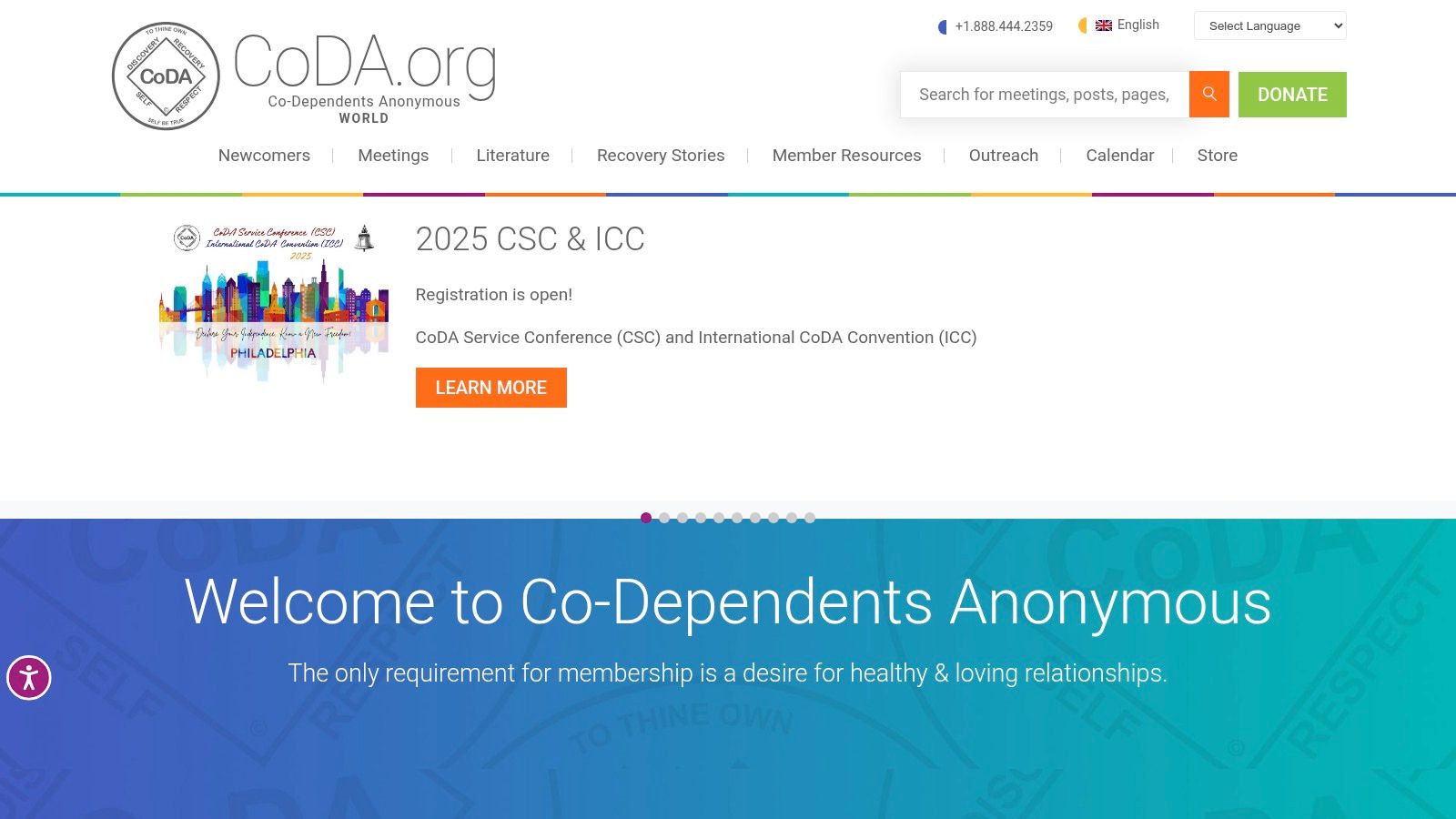
Key Features
- Worldwide meeting lists for online, phone, and in-person groups
- Free downloadable literature, including pamphlets and starter packets
- Program structure centered on the 12 Steps and 12 Traditions for relationship health
Pricing & Access
- Free to join with voluntary seventh-tradition donations
- No membership dues or fees are required to attend
- Meetings are available globally and can be accessed via the website directory
User Experience
The CoDA website offers a comprehensive meeting finder with filters for location, language, and format. While the interface is slightly dated, it effectively directs users to necessary resources and local intergroup contacts.
| Format | Access Method |
|---|---|
| In-person | Local and state finders |
| Virtual | Zoom link or phone |
Practical Tips
- Use the meeting finder to search for groups labeled "Beginner's Meeting."
- Download the free "Patterns and Characteristics of Codependence" pamphlet to see if the program resonates.
- Learn more about setting boundaries with a loved one to complement the program's work.
Pros & Cons
Pros
- Directly addresses codependent behaviors common in alcoholic relationships
- Completely free and maintains participant anonymity
Cons
- Program is not specific to alcohol-related issues
- Meeting availability and focus can vary significantly by location
Visit the official website to join: https://coda.org
9. Psychology Today — U.S. Support Group Directory
Psychology Today hosts the largest U.S. directory of therapist-led support groups. It is an excellent resource for finding professionally facilitated sessions, allowing users to filter by location and specific topics relevant to spouses of alcoholics, such as codependency or family conflict.
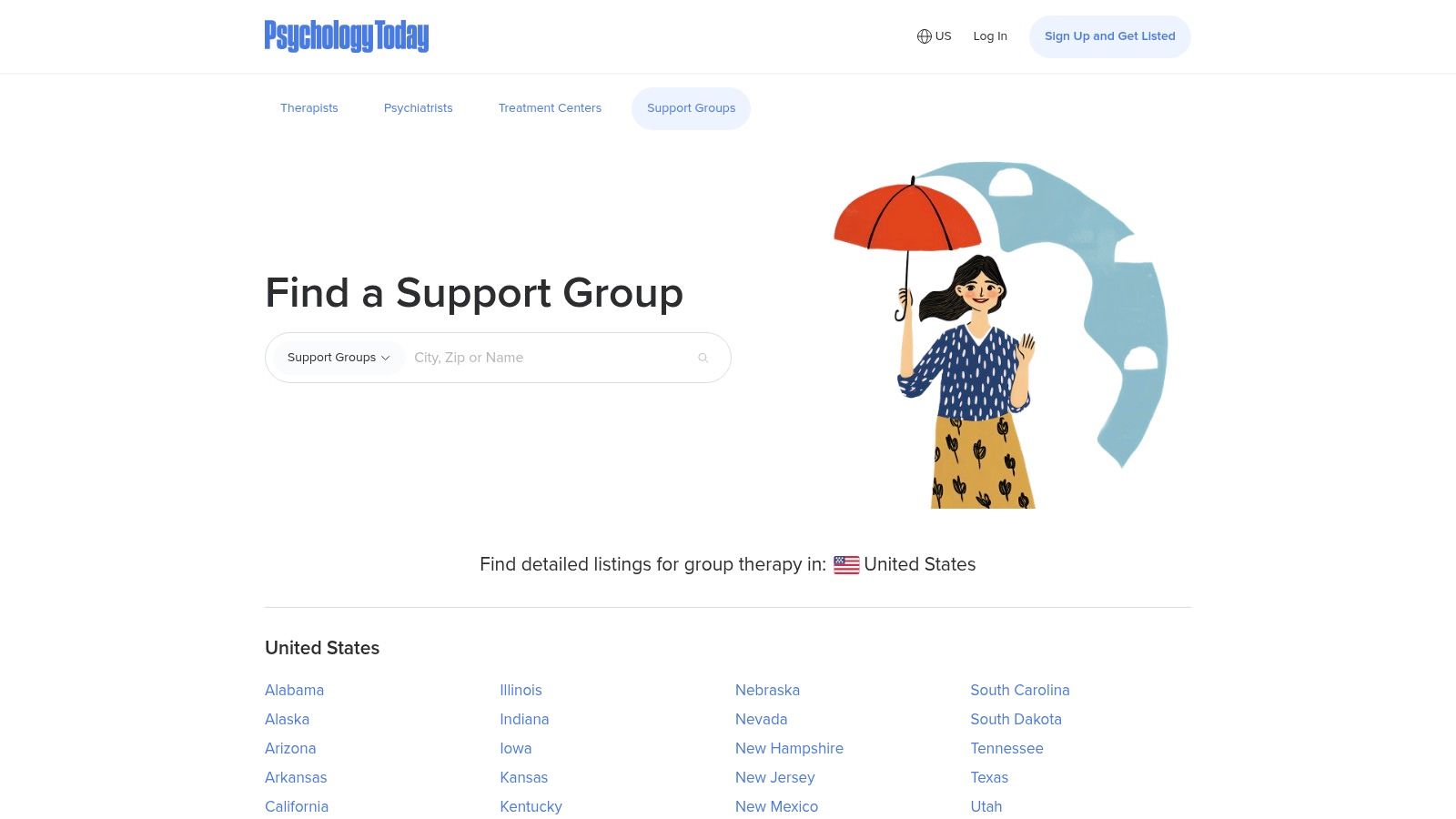
Key Features
- Nationwide listings with detailed facilitator credentials
- Filterable by topics like codependency, family of addicts, and betrayal trauma
- Direct contact forms to ask facilitators about enrollment and insurance
Pricing & Access
- Fee-based, with costs varying by group and facilitator
- Some groups accept insurance or provide receipts for reimbursement
- Access requires enrolling in specific, often time-limited, cohorts
User Experience
The website provides a clean, searchable directory that is simple to navigate. Each listing offers comprehensive details, making it easy to compare options and contact group leaders directly for enrollment.
| Format | Access Method |
|---|---|
| In-person | Local address provided in listing |
| Virtual | Zoom or other platform link after enrollment |
Practical Tips
- Use filters like "addiction" and "codependency" to narrow your search.
- Contact facilitators to ask about their approach and if they offer a free consultation.
- Check if a group offers a superbill you can submit to your insurance for reimbursement.
Pros & Cons
Pros
- Best for finding clinician-led, spouse-specific groups
- Many groups accept insurance or offer receipts for reimbursement
Cons
- Quality and cost vary significantly
- Many groups are time-limited and require a fee to join
Visit the official website to join: https://www.psychologytoday.com/us/groups
In The Rooms: 100+ Live Online Meetings for Spouses of Alcoholics
HeyPeers is a centralized platform hosting live, facilitated peer-support groups via video and chat for spouses of alcoholics. Users browse a searchable calendar to join anonymous, password-protected rooms led by trained peer supporters or nonprofit partners. Some sessions are free while others require a fee, making it a flexible choice outside traditional 12-step programs.
Key Features
- Searchable calendar of upcoming groups
- Anonymous video and chat-only rooms
- Mix of nonprofit partners and trained peer facilitators
- Free account registration with no subscription
- Session details include topic, host organization, fee
Pricing & Access
- Free sessions plus fee-based groups ($10–$25 per session)
- No long-term commitment or subscription required
- Register online with email and password
User Experience
The interface is modern and intuitive, with clear filters for topic and cost. Customer service is available via email and live chat during business hours.
| Format | Access Method |
|---|---|
| Virtual | Video link or chat |
Practical Tips
- Filter by “family impact” to find spouse-specific groups.
- Book sessions in advance to guarantee a spot.
- Test audio/video beforehand to avoid technical delays.
Pros & Cons
Pros
- Aggregates multiple organizations in one place
- Non-clinical, moderated support
Cons
- Spouse-specific availability fluctuates
- Session quality varies by host
Visit the official website to join: https://www.heypeers.com
11. Herren Project – Online Family Support Groups
Herren Project is a U.S nonprofit providing free online support groups for spouses and relatives impacted by alcohol use. Groups meet weekly with trained facilitators guiding discussions on grief, coping, and education.
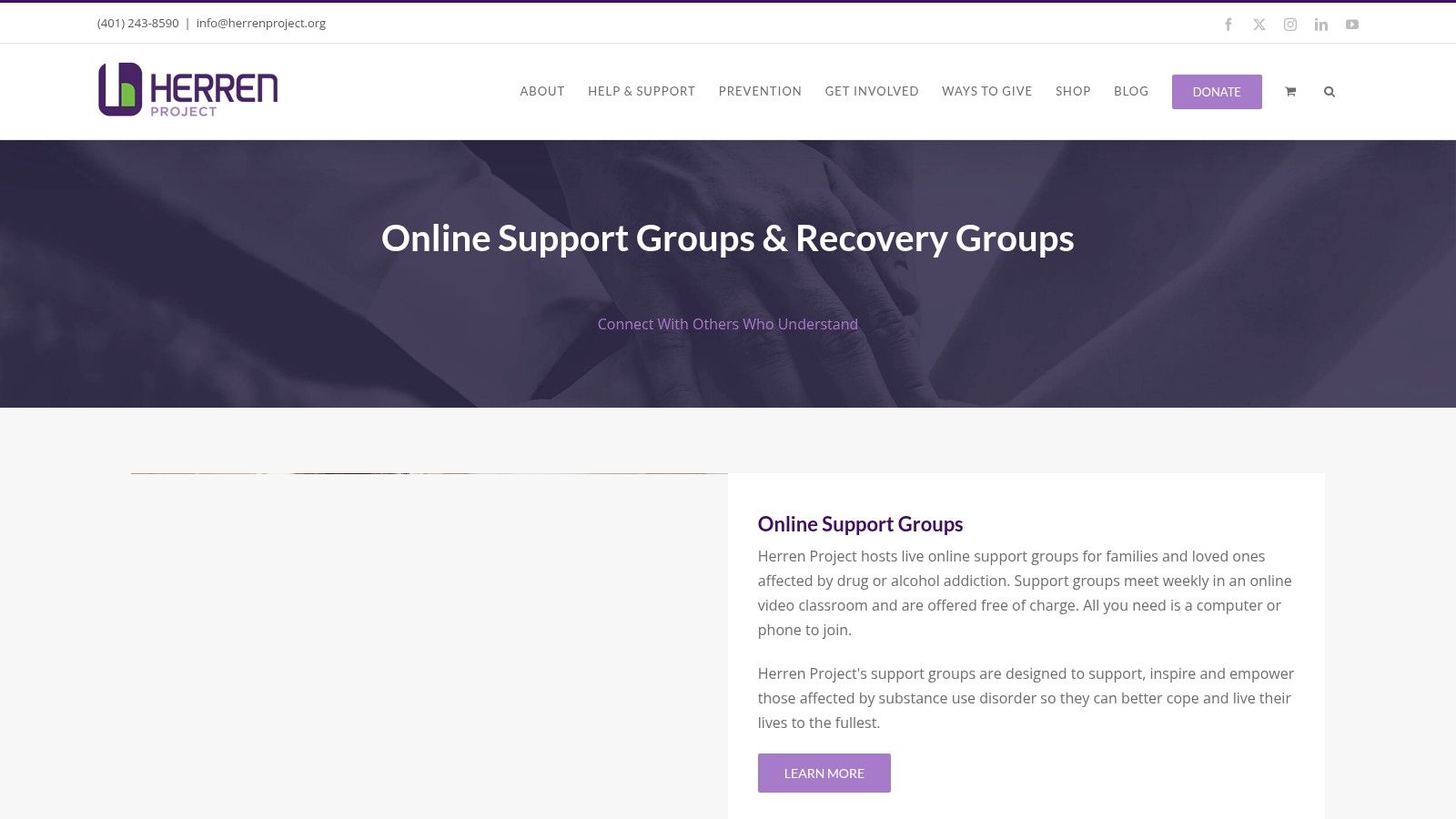
Key Features
- Facilitated weekly online meetings by phone or computer
- Resource hub with articles on grief, boundaries, and education
- Simple recurring session links with no signup required
Pricing & Access
- Completely free with voluntary donations accepted
- Open to all family members affected by alcoholism
- No registration fees or subscription plans
User Experience
The Herren Project website is intuitive with a clear schedule and direct call-to-action buttons. Audio and video links load quickly, and technical support is available via email.
| Format | Access Method |
|---|---|
| Virtual | Zoom link, phone dial-in |
Practical Tips
- Join a few minutes early to troubleshoot audio and video.
- Review the topic guide from the resource hub before sessions.
- Use the anonymous chat feature to share when you feel shy.
Pros & Cons
Pros
- Free and family-focused with trained facilitators
- Consistent weekly schedule simplifies planning
Cons
- Not spouse-only, includes broader family roles
- Smaller network than larger fellowships
Visit the official website to join: https://herrenproject.org/online-meetings/
12. Recovering Couples Anonymous (RCA)
Recovering Couples Anonymous (RCA) is a 12-step fellowship designed for couples who want to restore their relationship in the context of addiction. Unlike other support groups for spouses of alcoholics, it focuses on the couple as a unit, offering hybrid and online meetings where both partners work together through recovery principles.
Key Features
- U.S. meeting locator for in-person, hybrid, and online formats
- Couples-specific 12-step literature and meeting structures
- Local group pages provide direct access to schedules and Zoom info
Pricing & Access
- Free to attend with voluntary contributions
- No membership dues or fees required
- Meetings are accessible via the website's locator
User Experience
The website has a simple, community-run feel, prioritizing function over form. The meeting finder is the central tool, directing users to local group pages that contain specific access details like Zoom links and contact information.
| Format | Access Method |
|---|---|
| In-person | Local meeting finder on website |
| Virtual | Zoom link via local group pages |
Practical Tips
- Use the "Find a Meeting" tool as your primary navigation point.
- Review the couple-focused "Tools of the Program" before attending.
- Reach out to the listed contact person for a local group if you have questions.
Pros & Cons
Pros
- Unique support specifically designed for couples recovering together
- Many groups offer Zoom access, making meetings highly accessible
Cons
- Requires participation from both partners; not ideal for solo spouses
- Fewer groups than larger fellowships, so availability may be limited
Visit the official website to join: https://recovering-couples.org
Support Group Comparison for Spouses of Alcoholics
| Program / Service | Core Features / Modalities | User Experience / Quality ★ | Value Proposition 💰 | Target Audience 👥 | Unique Selling Points ✨ |
|---|---|---|---|---|---|
| 🏆 Outpatient Programs — Altura Recovery | Evidence-based therapies (CBT, DBT, EMDR, mindfulness), licensed clinicians, flexible scheduling (day, evening, virtual) | Personalized, trauma-informed, integrated psychiatric care ★★★★☆ | Structured, comprehensive outpatient care with relapse prevention 💰💰 | Individuals post-detox/inpatient, those needing flexible care 👥 | Step-down model, family sessions, motivational coaching ✨🏆 |
| Al‑Anon Family Groups | Peer support, in-person & virtual meetings, newcomer resources | Widely accessible, free, with variable meeting quality ★★★☆☆ | Free to attend, voluntary contributions 💰 | Families/spouses of alcoholics 👥 | Spouse-specific focus, official mobile app ✨ |
| SMART Recovery — Family & Friends | Skills-based CBT/motivational tools, free online & in-person meetings | Structured 90-min meetings; fewer sessions than Al-Anon ★★★☆☆ | Free meetings; handbook extra cost 💰 | Loved ones needing CBT tools beyond 12-step 👥 | Non-12-step, skill-building worksheets ✨ |
| Families Anonymous | 12-step fellowship, virtual/in-person, anonymity | Consistent support with free attendance ★★★☆☆ | No dues/fees 💰 | Families of addicts, including spouses 👥 | 24/7 email listserv, niche spouse groups ✨ |
| In The Rooms | Large online platform, 100+ weekly meetings, community features | Free access, anonymity options, diverse groups ★★★☆☆ | Free 💰 | Broad recovery community including families 👥 | High volume live video meetings, blogs ✨ |
| Hazelden Betty Ford — Family & Children Services | Virtual/in-person family groups, workshops, coaching | Clinically supervised content, mix of free & paid ★★★★☆ | Mixed free/paid; some HSA/FSA eligible 💰 | Families needing clinical support 👥 | Specialized sessions (Spanish, Native American) ✨ |
| Celebrate Recovery | Christ-centered, church-hosted, weekly Zoom meetings | Supportive faith community, free attendance ★★★☆☆ | Free 💰 | Faith-based recovery groups, codependency 👥 | Faith integration, national footprint ✨ |
| Co-Dependents Anonymous (CoDA) | 12-step, worldwide meetings & materials | Free with anonymity, variable availability ★★★☆☆ | Free 💰 | Spouses focusing on codependency/boundaries 👥 | Relationship health focus, downloadable materials ✨ |
| Psychology Today — U.S. Support Group Directory | Therapist-led support groups, searchable by topic/location | Clinician-led, fee-based, time-limited ★★★★☆ | Often fee-based; insurance accepted 💰 | Spouse-specific therapy groups 👥 | Facilitator credentials, insurance options ✨ |
| HeyPeers | Live moderated peer-support via video/chat | Mix of free and paid; quality varies ★★☆☆☆ | Free registration; some fees 💰 | Broad addiction & family-impact support 👥 | Centralized multi-org support groups ✨ |
| Herren Project — Online Family Support Groups | Free weekly facilitated online groups | Clear schedule, family-focused ★★★☆☆ | Free 💰 | Families new to support, broader family roles 👥 | Grief and education resources ✨ |
| Recovering Couples Anonymous (RCA) | Couples-focused 12-step fellowship, hybrid/online meetings | Couples participation needed; limited groups ★★★☆☆ | Free attendance 💰 | Couples recovering together 👥 | Couples-specific meeting formats & materials ✨ |
Taking the First Step Toward Your Own Recovery
Navigating the challenges of loving someone with alcoholism is an intensely personal and often isolating experience. Throughout this guide, we have explored a wide spectrum of support groups for spouses of alcoholics, each offering a unique pathway toward healing and understanding. From the structured, spiritual principles of Al-Anon and Celebrate Recovery to the evidence-based, secular approach of SMART Recovery Family & Friends, the variety ensures that a compatible community exists for nearly everyone.
The journey toward your own recovery is just as crucial as your loved one's. The resources detailed, whether online communities like In The Rooms and HeyPeers or clinically-supported programs from Hazelden Betty Ford, all share a common goal: to provide you with a safe space to process your emotions, learn healthy coping mechanisms, and reclaim your sense of self. Recognizing that your well-being matters is not selfish; it is a necessary act of survival and strength.
Choosing the Right Path for You
Selecting the right support system can feel overwhelming, but it doesn't have to be. Your choice should align with your personal beliefs, comfort level, and practical needs.
Consider these factors as you decide on your next step:
- Structure vs. Flexibility: Do you thrive with the clear steps of a 12-Step program like Al-Anon or CoDA, or do you prefer the more flexible, self-empowering tools offered by SMART Recovery?
- Spiritual vs. Secular: If faith is a cornerstone of your life, a group like Celebrate Recovery might be a perfect fit. If you prefer a non-religious, science-based approach, SMART Recovery or a clinical program may be more suitable.
- Anonymity and Accessibility: Online platforms such as Herren Project and HeyPeers provide immediate access and anonymity, which can be invaluable if you're not ready for in-person meetings or have a restrictive schedule. Directories like Psychology Today can help you locate vetted local groups.
- Specific Focus: Are you looking to heal the relationship itself? Recovering Couples Anonymous (RCA) is uniquely designed for this purpose. If your primary goal is your own codependency recovery, CoDA offers a dedicated focus.
Taking the first step is often the most difficult part. We encourage you to try a few different options. Attend an online meeting, call a local Al-Anon chapter, or simply browse the forums on a peer support site. The goal is to find a community where you feel seen, heard, and supported without judgment. Remember, you do not have to carry this burden alone. Connecting with others who share your experience is a powerful catalyst for healing, providing the validation and tools you need to build a healthier, more peaceful future for yourself.
If you believe a more structured, professional approach is needed for your family's recovery, Altura Recovery can help. Our specialized family programs provide the clinical guidance and educational resources necessary to heal relationships and support your loved one’s journey to sobriety. Visit Altura Recovery to learn how we integrate family support into a comprehensive and compassionate treatment plan.


